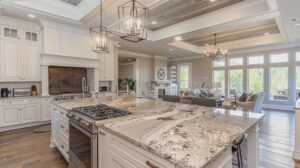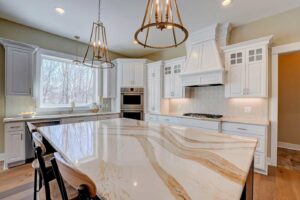Planning a kitchen renovation in Florida is exciting—but it’s also a bit of a science experiment. Between blazing sunshine, high humidity, and heavy everyday use, your countertops have to work harder here than in most other states. Choosing the best countertops for Florida kitchens means looking beyond color and style and focusing on how each material performs in this uniquely tropical environment.
This guide walks you through how Florida’s climate affects countertop performance, the pros and cons of popular materials, how heat and humidity factor in, and which options make sense for different lifestyles—from busy families to luxury homes and rentals. Whether you’re remodeling in Miami, Tampa, or planning a kitchen renovation in Orlando, these insights will help you make a confident, long-term choice.
How Florida’s Climate Affects Countertop Performance
Florida looks like paradise, but for building materials it’s more like a stress test. Countertops deal with three big environmental challenges: heat, humidity, and UV exposure.
Heat and Sun Exposure
In many Florida homes, especially those with open layouts, kitchens get a lot of natural light. Skylights, big sliders, and large windows let in heat and UV rays all day long.
Here’s what that means for your countertops:
- Surface temperature spikes: Countertops near windows and cooktops can get hot quickly.
- Thermal shock risk: Placing a hot pan directly on some materials can cause cracks or discoloration.
- Color fading: UV rays can bleach or yellow certain materials and resins over time.
If you cook often or your kitchen gets direct sun, looking at heat resistant countertops becomes essential, not optional.
Humidity and Moisture
Florida’s humidity isn’t shy. Moist air sneaks into every corner of your home, and kitchens deal with extra moisture from cooking, dishwashing, and spills.
Humidity affects countertops in a few key ways:
- Swelling and warping: Materials with wood or paper cores can swell if water gets in.
- Mold and mildew growth: Any material with seams, pores, or unsealed edges can harbor mold in a damp climate.
- Sealer breakdown: Natural stone sealers can degrade faster in a tropical environment, especially near sinks.
For this reason, humidity resistant countertops are a smart investment in Florida. You want materials that don’t absorb water easily and are easy to keep dry and clean.
Everyday Wear and Tear in Busy Florida Homes
On top of climate, think about lifestyle: sandy feet, kids running in from the pool, frequent entertaining, and high traffic. All of that translates into:
- Scratches from dropped utensils and dragged appliances
- Stains from citrus, wine, and coffee
- Etching from acidic foods (tomatoes, lemons, vinegar)
The best countertops for Florida kitchens aren’t just pretty—they’re tough enough to handle daily life in a warm, busy home.

Top Countertop Materials with Pros and Cons in Florida Homes
There’s no one-size-fits-all answer, but some materials perform noticeably better in a hot, humid climate than others. Here’s how the most popular options stack up for Florida homeowners.
Quartz Countertops
Engineered quartz is made from natural quartz crystals bound with resins. It’s one of the most popular choices in modern Florida kitchens.
Pros:
- Highly stain resistant
- Non-porous—great for humidity and mold resistance
- Low maintenance (no sealing required)
- Consistent patterns and colors
Cons:
- Resins can discolor under strong, direct UV over time
- Not the best for placing very hot pans directly on the surface
Best for: Busy families, low-maintenance remodels, and kitchen renovation Orlando projects where the kitchen doesn’t get extreme direct sunlight all day.
Granite Countertops
Granite is a natural stone with unique veining and color variations. It’s long been a go-to for high-end kitchens.
Pros:
- Very durable and scratch resistant
- Better heat tolerance than quartz (though trivets are still recommended)
- Adds strong resale value
- Handles occasional hot pans better than many engineered materials
Cons:
- Porous—must be sealed regularly, especially in humid Florida
- Some lighter granites are more prone to staining
- Natural variation can make matching slabs trickier
Best for: Homeowners who love natural stone, want a premium look, and are willing to keep up with sealing in a tropical environment.
Quartzite Countertops
Quartzite is a natural stone (different from engineered quartz) that offers a blend of durability and beauty.
Pros:
- Very hard and scratch resistant
- Excellent heat resistance compared to many other materials
- Often resembles marble with better durability
Cons:
- Still porous and needs regular sealing
- Can be more expensive than granite
- Some slabs are mis-labeled—quality sourcing matters
Best for: Luxury Florida kitchens where heat resistance, natural beauty, and long-term durability are key.
Porcelain Slab Countertops
Large-format porcelain slabs are gaining popularity, especially in modern and contemporary kitchens.
Pros:
- Outstanding heat resistance (one of the best options)
- Highly resistant to stains, scratches, and UV fading
- Very low porosity—excellent for humidity and mold resistance
Cons:
- Can chip on edges if impacted
- Fewer fabricators are experienced with large slabs
- Some people find the feel less “warm” than stone or wood
Best for: Sun-drenched Florida kitchens, indoor–outdoor spaces, and homeowners who want extremely heat resistant countertops with minimal maintenance.
Solid Surface (e.g., Corian)
Solid surface countertops are made from acrylic or polyester resins and fillers.
Pros:
- Non-porous and good against moisture
- Seamless appearance—great for long runs and integrated sinks
- Easy to repair minor scratches and burns
Cons:
- Not as heat resistant as stone or porcelain
- Can scratch more easily
- Can look less “premium” in luxury homes
Best for: Clean, modern kitchens, mid-range remodels, and homes that prioritize seamless, easy-to-clean surfaces.
Butcher Block Countertops
Wood countertops bring warmth and character, but Florida’s humidity makes them a bit high-maintenance.
Pros:
- Warm, natural look and feel
- Can be sanded and refinished
- Great for islands or accent areas
Cons:
- Sensitive to moisture and humidity
- Requires frequent sealing or oiling
- Can harbor bacteria if not maintained properly
Best for: Accent areas or islands in air-conditioned homes where owners are committed to regular care.
Laminate Countertops
Laminate is made from layers of paper and resin on a particleboard core. It’s budget-friendly and widely available.
Pros:
- Most affordable option
- Huge variety of patterns and colors
- Softer surface is gentle on dishes
Cons:
- Vulnerable to water damage at seams and edges
- Can delaminate or swell in high humidity if not installed perfectly
- Not truly heat resistant; hot pans can scorch or bubble the surface
Best for: Budget-conscious remodels, secondary kitchens, or short-term solutions.
Concrete Countertops
Concrete countertops can be cast in place or precast, offering a custom, modern look.
Pros:
- Customizable shape, color, and finish
- Good inherent heat resistance
- Unique, high-end aesthetic
Cons:
- Requires sealing (and resealing) to resist stains and moisture
- Can develop hairline cracks over time
- Heavier than other materials—cabinet structure must be strong
Best for: Design-forward and industrial-style kitchens where customization and style are top priorities.
Heat Resistance Comparison by Material
Heat resistance is a big deal when you’re cooking with cast iron, baking sheets, and hot pots. While you should always use trivets and hot pads, some materials handle heat better than others.
Relative Heat Resistance Overview
- Excellent Heat Resistance: Porcelain slab, quartzite, granite, concrete
- Good Heat Resistance (with care): Engineered quartz, solid surface
- Fair to Poor Heat Resistance: Laminate, butcher block
Practical Takeaways
- If you routinely move pans straight from the stove or oven to the counter, prioritize heat resistant countertops like porcelain, granite, or quartzite.
- Engineered quartz performs well in normal use but doesn’t love long-term exposure to very high heat.
- Laminate and wood can scorch, burn, or blister quickly, making them less forgiving in heavy-cooking households.
Humidity & Mold Resistance Comparison
In a tropical climate, moisture is the silent enemy. The best countertops for Florida kitchens are those that resist water absorption and are easy to keep dry and clean.
Materials That Shine in Humidity
- Top performers: Engineered quartz, porcelain slab, solid surface
- Good with proper maintenance: Granite, quartzite, concrete (all require regular sealing)
- More vulnerable: Laminate (at seams and edges), butcher block
Mold and Mildew Considerations
- Non-porous surfaces like quartz, porcelain, and solid surface are naturally more humidity resistant countertops options.
- Natural stone can perform well if it’s properly sealed and resealed on schedule.
- Wood and laminate require extra vigilance around sinks and dishwashers, where leaks or splashes can cause long-term damage.
Maintenance Tips in a Tropical Climate
Florida kitchens stay beautiful longer when you dial in a maintenance routine that respects the climate.
Daily Care
- Wipe up spills quickly—especially citrus, wine, oil, and coffee.
- Use a soft cloth or sponge with mild dish soap.
- Avoid harsh, abrasive cleaners that can dull finishes or break down sealers.
Weekly and Monthly Care
- Inspect areas around sinks, dishwashers, and windows for moisture.
- Dry any condensation or standing water quickly.
- Use cutting boards and trivets to protect against scratches and heat.
Sealing and Long-Term Protection
- Granite, quartzite, and concrete: Plan on sealing at least once a year in Florida, sometimes more for lighter stones or heavily used surfaces.
- Butcher block: Oil regularly (often monthly) with food-safe mineral oil or a specialized conditioner.
- Quartz, porcelain, solid surface: No sealing needed, but keep them clean and avoid extreme heat.
A small, consistent care routine goes a long way in a humid, coastal environment.
Cost Ranges and Lifespan
Prices vary by brand, thickness, edge profile, and installation complexity, but here are typical installed cost ranges and general lifespans.
Approximate Cost per Square Foot (Installed)
- Laminate: ~ $20–$40 per sq. ft.
- Butcher Block: ~ $40–$80 per sq. ft.
- Solid Surface: ~ $50–$90 per sq. ft.
- Granite: ~ $50–$100+ per sq. ft.
- Quartz: ~ $60–$120+ per sq. ft.
- Concrete: ~ $75–$140 per sq. ft.
- Quartzite: ~ $80–$150+ per sq. ft.
- Porcelain Slab: ~ $70–$130+ per sq. ft.
Typical Lifespan in Florida Conditions
- Laminate: 10–15 years with careful use
- Butcher Block: 10–20 years (more with regular refinishing)
- Solid Surface: 20+ years
- Granite/Quartz/Quartzite/Porcelain/Concrete: 25+ years when well maintained
Higher upfront investment often delivers longer lifespan and better performance in heat, humidity, and daily wear.
Recommendations for Different Lifestyles
Choosing the best countertops for Florida kitchens depends a lot on how you actually live in the space.
Busy Families
Priorities: durability, stain resistance, easy cleaning.
- Best picks: Engineered quartz, granite, or porcelain.
- Why: They stand up to spills, snacks, homework projects, and constant use. Quartz is especially family-friendly thanks to its non-porous surface.
Rental Properties & Vacation Homes
Priorities: durability, low maintenance, good looks for listing photos.
- Best picks: Quartz and granite.
- Why: They photograph beautifully, are widely recognized as premium materials, and handle turnover cleanings well. Porcelain is also excellent if your installer is experienced with it.
Luxury Kitchens & High-End Remodels
Priorities: distinctive style, long lifespan, climate performance.
- Best picks: Quartzite, high-end granite, porcelain slab, or custom concrete.
- Why: These materials offer unique patterns, excellent durability, and strong heat performance. In oceanfront or sun-drenched homes, porcelain’s UV resistance is a major plus.
Small Spaces and Condos
Priorities: value, light-reflecting surfaces, low maintenance.
- Best picks: Light-colored quartz or solid surface.
- Why: These materials brighten compact kitchens and are easy to care for, making condo living simpler.
Local Insights Specific to Orlando Renovations
Planning a kitchen renovation Orlando homeowners can rely on means thinking about more than just materials—you also want to factor in how Central Florida homes are built and used.
Climate and Lifestyle in Orlando
- Many Orlando kitchens are part of open-plan living spaces, so countertops may receive plenty of natural light.
- Outdoor living is big here—if your kitchen opens to a lanai or pool area, consider materials that transition well to outdoor kitchens, like porcelain or granite.
- Summer thunderstorms and high humidity make moisture management a priority; non-porous or well-sealed surfaces earn their keep.
Working with Local Pros
- Local fabricators and designers understand which stones and brands perform best in the region’s climate.
- They can guide you toward quartz brands with better UV stability, sealers that hold up longer, and edge profiles that resist chipping.
- Permitting and timeline planning are important in Orlando, especially if your renovation involves moving walls, plumbing, or electrical.
When you’re comparing bids for a kitchen renovation in Orlando, don’t just look at the price per square foot. Ask how the recommended material will handle heat, humidity, and high use over the next 10–20 years.
FAQs: Best Countertops for Florida Kitchens
1. What are the best countertops for Florida kitchens overall?
There’s no single winner, but engineered quartz, granite, quartzite, and porcelain slab are top contenders. They balance durability, aesthetics, and performance in heat and humidity. The “best” choice depends on your budget, how much you cook, and how much maintenance you’re willing to do.
2. Which countertops are most heat resistant?
Porcelain slab, quartzite, granite, and concrete are among the most heat resistant countertops. That said, it’s still smart to use trivets and hot pads to protect any material from thermal shock or discoloration.
3. What countertops are best for Florida humidity and mold prevention?
If you’re focused on humidity resistant countertops, look at engineered quartz, porcelain, and solid surface. These materials are non-porous and easier to keep dry and sanitized. Well-sealed granite or quartzite can also perform well when maintained correctly.
4. How often should I reseal stone countertops in Florida?
For most granite, quartzite, and concrete countertops in a Florida kitchen, expect to reseal about once a year. High-use areas or lighter stones may benefit from more frequent sealing. A simple water-drop test can help you know when it’s time: if water soaks in instead of beading, it’s time to reseal.
5. Are light or dark countertops better for Florida homes?
Both can work. Light countertops help reflect light and keep the kitchen feeling bright and airy—great for smaller spaces and condos. Dark countertops can look dramatic and luxurious but may show dust, water spots, and fingerprints more easily. The key is picking a surface that complements your cabinets, flooring, and natural light.
6. What’s the best budget-friendly option for a Florida kitchen?
Laminate is the most affordable, but you’ll need to be extra careful with water and heat. For a balance of value and durability, entry-level quartz or granite can be a smart long-term investment, especially in a primary home or rental property.
Conclusion: Choosing the Best Countertops for Florida Kitchens
Florida’s tropical climate doesn’t have to make your kitchen renovation complicated—but it should influence your decisions. When you factor in heat, humidity, and everyday life, materials like quartz, granite, quartzite, and porcelain slab stand out as some of the best countertops for Florida kitchens.
Ask yourself how you use your kitchen, how much maintenance you’re comfortable with, and how long you plan to stay in the home. Combine that with smart material choices and guidance from local pros, and you’ll end up with countertops that look beautiful and perform reliably for years.
If you’re planning a kitchen renovation in Orlando or anywhere in Florida, now is the perfect time to explore your options, compare materials, and talk with experienced fabricators. Choose countertops that are built for heat, humidity, and everyday life—and enjoy a kitchen that truly works for the way you live.





